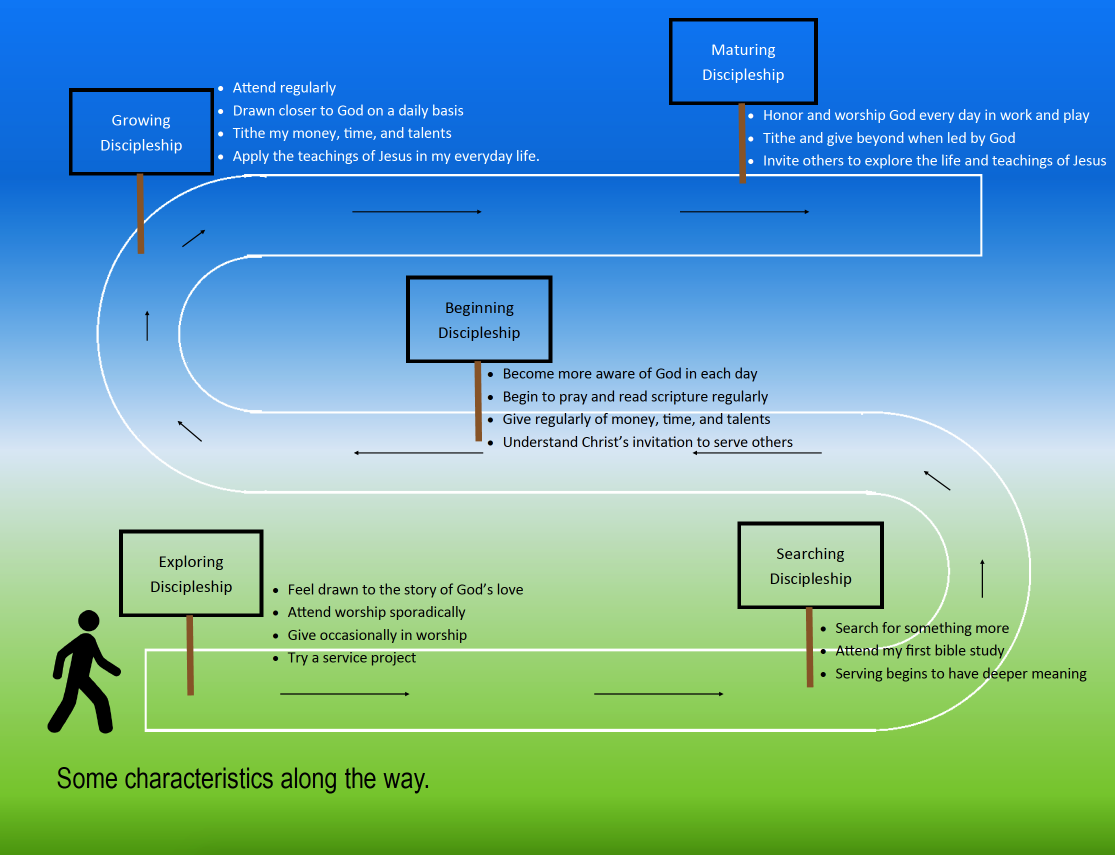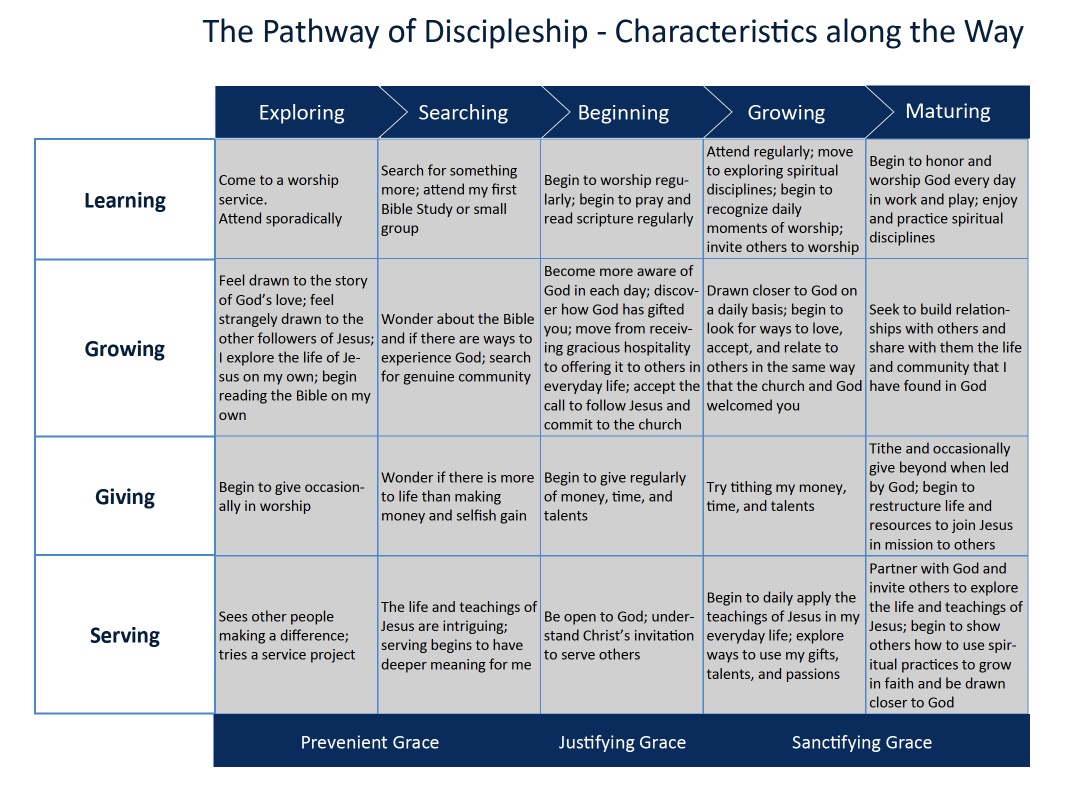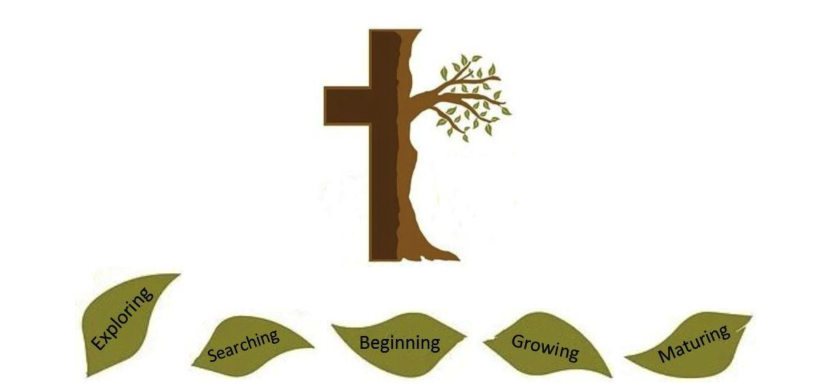Pathway of Discipleship

Overview
Research conducted in 1999 by George Barna reports that nearly half of Americans at that time claimed to be “born again.” However, that same report went on to state that only 13% of those making the claim reflected behaviors and attitudes that were different from the world around them.i If Christians are born into a new life, the ways they engage the world should bear some significant differences from the world around them. But this does not seem to be the case. What has caused this disconnect in Christianity and the church and what can we do? Perhaps the church can recognize that over time, in many ways, the church has become more like the world where education and philosophy are the answers to life’s problems, and less like Jesus who continued to seek out people and engage them where they are with a compelling message of love, peace, and hope.
Perhaps the church in recent decades has replaced emphasizing discipleship with programs emphasizing Christian Education. Discipleship and Christian Education are not the same thing, although they have a direct relationship.
Likewise, membership is not discipleship. Our tendency is to assume that inviting someone to become a member of the church is the same thing as inviting them to become a disciple. The vows of membership for joining the church are vows based on actions we intend to undertake as a part of the congregation. Membership vows include our prayers, presence, gifts, service, and witness to the world, but fail to promise that we will seek transformed lives. Make no mistake, membership is important. But discipleship is about transformed lives. Perhaps we should keep in mind that all members are not disciples, but all disciples will be members.
Our understanding of discipleship is rooted in Scripture where Jesus is seen, heard, and experienced by people from all walks of life, including those with a faith foundation and those who have yet to know God in any way, shape, or fashion. As a Church, we follow Jesus’ command (which we often call The Great Commission) that is found in Matthew’s Gospel:
Then the eleven disciples went to Galilee, to the mountain where Jesus had told them to go. When they saw him, they worshipped him; but some doubted. Then Jesus came to them and said, “All authority in heaven and on earth has been given to me. Therefore go and make disciples of all nations, baptizing them in the name of the Father and of the Son and of the Holy Spirit, and teaching them to obey everything I have commanded you. And surely I am with you always, to the very end of the age.” Matthew 28: 16-20
Our understanding of the Christian faith, therefore, is a “going” faith. Our Mission Statement at FUMC (below) is based on The Great Commission. The spirit of the Methodist movement is characterized by going to the people with a passion for making disciples. Unfortunately, we often forget that our passion and drive as Methodists for disciple-making is found in the actual effort, continuing and ongoing, to respond to Jesus’ command to “go and make disciples.” We need to be reminded of the continuing journey and process to which Jesus spoke. As we cease the “going,” there seems to be less passion for making disciples who are transforming the world.
Jesus went through all the towns and villages, teaching in their synagogues, proclaiming the good news of the kingdom and healing every disease and sickness. When he saw the crowds, he had compassion on them, because they were harassed and helpless, like sheep without a shepherd. Then he said to his disciples, “The harvest is plentiful but the workers are few.” Matthew 9: 35-37
FUMC Decatur’s Pathway of Discipleship is designed to help each of us understand discipleship and the characteristics of a disciple, acknowledging that our spiritual growth as disciples is much like a lifetime that each of us navigates in the physical world. In other words, we generally have a time when we are born, the early developmental stages of young life, adolescence and young adulthood, adulthood, and into our golden years. As we physically age and grow, our mental and spiritual capacities grow as we all move toward maturity, acknowledging that the pace of change/growth is not the same for all of us.
We are not meant to remain as children…but we are meant to speak the truth in love, and to grow up in every way into Christ, the head. Ephesians 4:14
Our spiritual or faith life can also be compared to the stages of human life. We will use that comparison to help us see or determine where we are in our spiritual lives as disciples of Jesus and to see what stages of life (and discipleship) still lie ahead. For our Pathway of Discipleship, we understand the stages of life/growth in five periods or stages. These stages, from birth to the latter or last days of life, are called: “Exploring, Searching, Beginning, Growing, and Maturing.” Every person is different. Not everyone moves through the stages of life at the same age or at the same pace. Nevertheless, we use these stages and the image of a path or trail, in order to remind ourselves that discipleship is a lifetime journey.
A discipleship pathway is intended to provide us (our spiritual lives) with guidance, confidence, encouragement, and assurance along the way.
Therefore, we offer this intentional system of discipleship in hopes that persons are able to sense who Jesus is calling them to be as a follower; to determine their current stage of Christian maturity (growth); and to better understand how their future journey of discipleship can be lived out in the context of relationships with Jesus, within the local church and with neighbors; and ways that the local church offers its ministries of support and nurture to people.The Mission of Decatur FUMC
To make disciples of Jesus Christ for the transformation of the world.
Discipleship is more than information – it is about behaviors. Discipleship is not only about education, but about transforming lives.
FUMC’s intentional pathway or system for discipleship acknowledges that discipleship is both personal and corporate. Both are necessary for healthy discipleship to take place.
Personal (the individual):
Each person owns their growth. The individual maximizes the things that are under their control so that the best possible growth can occur.
Corporate (the church):
The church does everything it can as a church to provide opportunities for people to grow and mature in their faith. Discipleship occurs in relationships – with Jesus and with others as we move toward maturity.
The Vision of Decatur FUMC
We are a people of grace, love, and hope who faithfully participate in a way of life that includes learning, growing, giving, and serving God.
Learning · Growing · Giving · Serving
Through the acts of learning, growing, giving, and serving God, we see ourselves as always being readied for the ongoing transformation into disciples of Christ Jesus and better prepared to be the embodiment of Christ for others, so that their lives are transformed, as well as our own. All of our beliefs, understandings, and resulting works have their origin in God’s gifts and movements of grace for us.
What is a Disciple?
We have been talking about discipleship, disciples, disciple-making, pathways and more, but it is also important to have a solid understanding of what we mean when we use the term “disciple.” There are many different kinds of disciples throughout the world (a person could be a dedicated follower of a philosophy or another person, for instance). We, however, are talking about Jesus and trying to adhere to his ideas and ideals so that in and through us, others can see that we are followers or disciples of Christ Jesus.
And he said to them, “Follow me and I will make you fish for people.” Matthew 4: 19
Jesus invites us to follow him. It’s not for a few moments but for a lifetime. In fact, to be a follower or disciple of Jesus is to undergo a lifestyle change (again, for a lifetime) where we strive to emulate Jesus in every moment in every action.
Jesus is not inviting us to follow him into a life filled with regulations and prohibitions, but into an abundant, grace-filled life centered upon God. As previously mentioned, the life of a disciple of Jesus is a journey through which we move and grow in maturity (like the stages of life described earlier). As a disciple, life increasingly becomes Christ-centered and life-surrendered.ii
Then Jesus said to his disciples, “If any want to become my followers, let them deny themselves and take up their cross and follow me. For those who want to save their life will lose it, and those who lose their life for my sake will find it.” Matthew 16: 24-25
Becoming a disciple is not simply learning about Jesus or the characteristics of a disciple, but becoming like Jesus. To be a disciple of Jesus is to do life as Jesus did life. Three dimensions of life are apparent for those who would be disciples: be a part of the body of Christ; become more like Jesus (think journey and stages of life); and join Jesus in ministry (disciples participate alongside Jesus in ministry and don’t simply observe or stay on the sideline watching).
Our Church Vision Statement (above) reflects four very important aspects or iterations of what a disciple’s life looks like in our understanding: Learning · Growing · Giving · Serving.

Learning – a disciple is one who continues to learn about God, self, and others. From the moment they are drawn to the stories of God and continuing throughout their years, disciples continue to open themselves to new understandings of faith and the truths of God. Learning is accomplished individually (private study, for example) and in community (worship, small groups, Bible studies, etc.) where relationships of trust are built and transformation can be encouraged and supported by others.

Growing – a disciple who is growing is discovering how to do life in a way that honors God. Growing disciples experience a deepening understanding of what it is that God wants for their life. Their thoughts and actions reflect a life that is being transformed by the love of God and desire to be more like Jesus.

Giving – as a disciple grows, there is an increasing realization that giving recognizes God as the source of all blessings and that giving of financial resources, time, and talents should come from the heart. A growing disciple begins to understand that the Bible speaks of the tithe (the first 10%) as a standard for giving of financial resources, given to God and the work of the church. If unable to reach the Biblical standard of the tithe, growing disciples commit their giving through intentional, increasing steps toward a tithe. Maturing disciples often grow in their generosity beyond the tithe.

Serving – serving God and others exemplifies the life of a disciple. Disciples join with Jesus in ministry with others to invite and encourage people to learn, grow, give, and serve. In service to God and others, disciples, as they grow and mature, become more and more the embodiment of Christ for others and are committed to the work of making more disciples.
For an easier understanding of “what is a disciple?” we use the following:
A disciple is someone who knows Christ, is learning about Christ, is growing in Christ, is giving like Christ, and is serving like Christ.
It is important to remember that a disciple is being transformed along the journey. This means that a maturing disciple will have some differing characteristics than say an exploring, searching, or even beginning disciple would. Consider these example characteristics of disciples and mature disciples:
Disciple
- A disciple worships.
- A disciple is part of a community.
- A disciple commits to spiritual practices.
- A disciple is generous and serves.
- A disciple is seeking to be Christ-like.
Mature Disciple
- A maturing disciple begins to worship every day, including the Sabbath; invites others to worship.
- A maturing disciple builds relationships with others and shares with them the life and community they have found in God and their faith community.
- A maturing disciple enjoys and practices spiritual disciplines and begins to show others how to use them to grow in their faith and be drawn closer to God.
- A mature disciple tithes and gives beyond a tithe as God leads and restructures their life and resources to join Jesus in ministry to others.
- A maturing disciple partners with God and invites others to explore the life and teachings of Jesus.
Discipleship Occurs at All Ages
While we have given a great amount of attention toward adult discipleship and corresponding phases, discipleship also occurs with children and youth but in a much shortened period of time usually. If you are a parent, sponsor of a young person, or are a young person, these opportunities are offered and intended to help develop and nurture a young person toward a growing faith and life as a disciple. Therefore, we offer the following as opportunities for discipleship to occur:
Children
- Sunday School
- Worship (includes opportunities to see worship and faith modeled by people of all ages, Children’s Sermon, Kidz Worship, serving/leading in worship as Acolytes and receiving the “Noisy Offering” once each month)
- Wednesday night activities
- Service/Mission projects with CIA (Children In Action)
- Summer Camp
Youth
- Sunday School
- Bible Studies
- UMYF (or “Youth” or United Methodist Youth Fellowship – typically Sunday evening activities of learning and fun that shape the individual but in a group setting)
- Confirmation (as children near the age of 12 or are in 6th Grade, they are invited to participate in a process that helps them understand the Christian faith and offers them the opportunity to profess their own faith in Jesus as Lord of their life).
- Wednesday night activities
- Service/Mission projects, especially a summer mission trip
- Mid-Winter Retreat
- Summer Camp
- Chrysalis (weekend event of spiritual growth for older teens)
The opportunities for children and youth vary from time-to-time. These are some of the most common, as well as the most important to facilitate young discipleship.
The accompanying pathway image, as well as the chart showing example characteristics of a changing life as a disciple, are provided to help in understanding our plan or pathway for discipleship. Every person is invited to locate their “current” stage of discipleship and also see what future stages entail. Every person is invited to take one step deeper/further along the path, to find a “next step” along this lifelong journey of following Jesus. While the Church does not force you onto such a path, it is committed to God and each person to assist in every possible way in order to faithfully fulfil Jesus’s command to make disciples.


i Maynard, Phil, Membership to Discipleship: Growing Mature Disciples Who Make Disciples, USA, 2015, p. 11. ii Ibid, 18.


